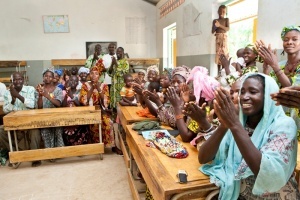During a visit to the Aga Khan Foundation USA office, Kathy Bartlett and Caroline Arnold, co-directors of Education for Aga Khan Foundation in Geneva, spoke about the Reading for Children program. They discussed how the program spread from the Kyrgyz Republic in Central Asia to West Africa and how it exemplifies the Aga Khan Development Network’s approach to sustainable development. This is adapted from that conversation.
Reading for Children program began in the Kyrgyz Republic with an aim to instill in children a love for books and enthusiasm for reading. It does this in three ways, by:
- increasing access to quality storybooks through mini-libraries;
- encouraging parents and other caregivers to read with their children; and
- nurturing Kyrgyz storytellers and engaging them in the publication of those books.
When Kyrgyzstan became independent of the Soviet Union in 1991, there were no Kyrgyz-language books for children. All books were in Russian. So we at Aga Khan Foundation focused on working with Kyrgyz authors and illustrators to produce story books in the local language in order to help preserve local cultures and make their stories meaningful to new readers.
In 2010, conflict along ethnic lines flared up in the Kyrgyz Republic reflecting deep-seated tensions. So we translated the story books into other local languages in addition to Kyrgyz, and we’ve created new titles that specifically address the issues of diversity and pluralism. Those publication lines will continue with funds from UNICEF. The Kyrgyz government bought thousands of these books and put them in schools across the country. (Earlier this year the U.S. Agency for International Development funded the reprinting of many of the books, described in this June 6 blog.)
In the Kyrgyz Republic, people got really excited about what they saw in children’s reading interest and the use of the mini-libraries. They made visits to the villages and saw the reading program at work. A number of colleagues from other countries said, “We’d like to take that idea and adapt it to our context.” With support from the Marshall Foundation and in collaboration with our rural development colleagues, we received a grant to test the mini-libraries as a pilot effort in India, and in Mali and Tajikistan.
From supporting 56 mini-libraries used by over 16,000 children in the Kyrgyz Republic, the program has spread elsewhere in Asia and to Africa. It is a good example of how communities get excited about an idea, and the process of how Aga Khan Foundation works with communities in choosing their priorities.

The reading program in Mali taps into the country’s strong oral tradition, with classes based in literacy classes, Early Childhood Development centers and women’s horticulture groups.
Now AKF has arranged funding for mini-libraries in Mali, which has a strong oral literature tradition but low reading capacities among students in primary school. In Mali the mini-libraries are connected to women’s literacy groups, to women’s garden farmers groups, to the local pre-schools. The program has also adapted traditional stories as books for new readers, including The Adventure of Soundjata, a central story in Malian culture.
In Mali the program established two dozen Reading for Children groups based in literacy classes, Early Childhood Development centers and women’s horticulture groups. More than 300 pre-school children and nearly 3,000 primary school children are benefiting from AKF’s activities, along with nearly 60 pre- and primary school teachers. According to program reports, the busiest time for the mini-libraries is July through October, before the rainy season when the crops demand attention.